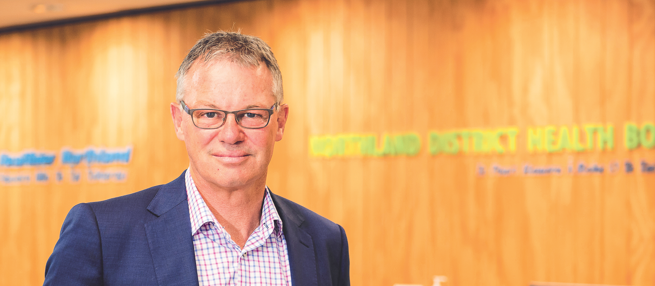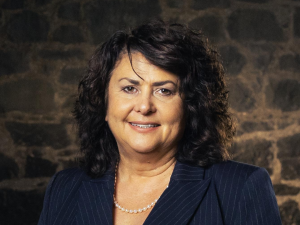Respiratory physician Lutz Beckert considers chronic obstructive pulmonary disease management, including the prevention of COPD, the importance of smoking cessation and pulmonary rehabilitation, and the lifesaving potential of addressing treatable traits. He also discusses the logic of inhaler therapy, moving from single therapy to dual and triple therapy when indicated, as well as other aspects of management
Top Te Whatu Ora staff member ‘demoralised’ by smokefree backtrack
Top Te Whatu Ora staff member ‘demoralised’ by smokefree backtrack

The Government’s top health officials were so concerned by its decision to repeal the smokefree generation law that at least one considered quitting.
Documents released by Te Whatu Ora show outright anger from top health officials, who discussed how to try and stop the Government’s repeal of a law which would have led to New Zealand stopping the sale of cigarettes.
Te Whatu Ora national director for public health, Dr Nick Chamberlain said he was so concerned by the moral and ethical dilemma of repealing the smokefree legislation that he was considering whether he could continue working in the role.
As the national public health director, Chamberlain is one of the Government’s most important health officials - effectively a deputy chief executive of the department operating every hospital. Before this, he worked for 12 years as chief executive of Northland DHB. He remains working at Te Whatu Ora.
Stuff asked Chamberlain about his decision to stay, and how he felt given the Government had since repealed the smokefree generation legislation.
An emailed statement, sent on behalf of Chamberlain, said: “I regret how this played out.”
“As a public servant, I remain committed, as I have been throughout my careers, to working to achieve better health outcomes for all New Zealanders,” he said.
Stuff followed up asking what he regretted. Did he regret that the law was repealed, or how he’d responded to the issue? But there was no response.
In the emails from November, Chamberlain told colleagues he was hoping to discuss his concerns with Health Minister Dr Shane Reti.
He said he hoped, that given Reti remained a doctor, he could be convinced.
In an email to top medical officers, Chamberlain said: “I'm sure we have all been challenged ethically and morally by the notion, firstly that our Government will repeal the Smokefree legislation, and even more so that this will help fund tax cuts. I'm sure anyone working in Public Health will feel pretty demoralised by this, but I'm aware that we signed an oath.”
“I have discussed with a few senior people as to what my next moves should be personally/professionally, but I am hoping to have a chance to discuss this with our new Minister (who is also still a practising Doctor) in the next day or two,” he said.
Other public health officials shared their unease.
“It’s hard to explain this to the kids,” replied one senior epidemiologist and public health leader.
Reti said he never met Chamberlain. He denied convincing him to stay in the role.
“This was a decision made by Cabinet,” Reti said.
“We continue to be pleased with the reduction from 8.6% to 6.8% in smoking.”
Although Reti, as minister of health, was initially responsible for smoking policy there was a change of ministerial delegations shortly after the coalition came to power. NZ First MP Casey Costello took on responsibility for smoking reform, as associate health minister.
Reti said he believed Costello was committed to lowering smoking rates.
Te Whatu Ora boss Margie Apa said these emails, proactively released by Te Whatu Ora, showed internal communications and “candid” dialogue.
“We also want to be open, however, that some comments do not meet our expectations for conducting work with integrity and political neutrality,” she said.
Officials labelled the scrapped plan, passed by Labour in 2022, as the “endgame” for tobacco.
Chamberlain, alongside Director-General of Health Dr Diana Sarfati and Apa, worked with other top health advisors to provide urgent advice to Cabinet about repealing the smokefree legislation.
Apa suggested the focus on the financial burden of repealing the legislation.
“We need to make legislation look like the cheapest option,” she said.
They also discussed how unpopular, both among the medical profession and the public, repealing the bill was.
Safarti wrote, “The Government is certainly under considerable pressure”.
She agreed that cost should be focused, but warned against other suggestions - including advice that the Government could consider introducing a sugar tax to offset the public health cost of increased smoking.
The officials estimated that, through decreased demand on health services and tax revenue from people that would die, the endgame strategy would have saved $50 billion by 2050.
TELL US WHAT YOU THINK
You can add your comments using the comment function below, or by sending a Letter to the Editor to editor@nzdoctor.co.nz










![Barbara Fountain, editor of New Zealand Doctor Rata Aotearoa, and Paul Hutchison, GP and senior medical clinician at Tāmaki Health [Image: Simon Maude]](/sites/default/files/styles/thumbnail_cropped_100/public/2025-03/Barbara%20Fountain%2C%20editor%20of%20New%20Zealand%20Doctor%20Rata%20Aotearoa%2C%20and%20Paul%20Hutchison%2C%20GP%20and%20senior%20medical%20clinician%20at%20T%C4%81maki%20Health%20CR%20Simon%20Maude.jpg?itok=-HbQ1EYA)
![Lori Peters, NP and advanced health improvement practitioner at Mahitahi Hauora, and Jasper Nacilla, NP at The Terrace Medical Centre in Wellington [Image: Simon Maude]](/sites/default/files/styles/thumbnail_cropped_100/public/2025-03/2.%20Lori%20Peters%2C%20NP%20and%20advanced%20HIP%20at%20Mahitahi%20Hauora%2C%20and%20Jasper%20Nacilla%2C%20NP%20at%20The%20Terrace%20Medical%20Centre%20in%20Wellington%20CR%20Simon%20Maude.jpg?itok=sUfbsSF1)
![Ministry of Social Development health and disability coordinator Liz Williams, regional health advisors Mary Mojel and Larah Takarangi, and health and disability coordinators Rebecca Staunton and Myint Than Htut [Image: Simon Maude]](/sites/default/files/styles/thumbnail_cropped_100/public/2025-03/3.%20Ministry%20of%20Social%20Development%27s%20Liz%20Williams%2C%20Mary%20Mojel%2C%20Larah%20Takarangi%2C%20Rebecca%20Staunton%20and%20Myint%20Than%20Htut%20CR%20Simon%20Maude.jpg?itok=9ceOujzC)
![Locum GP Helen Fisher, with Te Kuiti Medical Centre NP Bridget Woodney [Image: Simon Maude]](/sites/default/files/styles/thumbnail_cropped_100/public/2025-03/4.%20Locum%20GP%20Helen%20Fisher%2C%20with%20Te%20Kuiti%20Medical%20Centre%20NP%20Bridget%20Woodney%20CR%20Simon%20Maude.jpg?itok=TJeODetm)
![Ruby Faulkner, GPEP2, with David Small, GPEP3 from The Doctors Greenmeadows in Napier [Image: Simon Maude]](/sites/default/files/styles/thumbnail_cropped_100/public/2025-03/5.%20Ruby%20Faulkner%2C%20GPEP2%2C%20with%20David%20Small%2C%20GPEP3%20from%20The%20Doctors%20Greenmeadows%20in%20Napier%20CR%20Simon%20Maude.jpg?itok=B0u4wsIs)
![Rochelle Langton and Libby Thomas, marketing advisors at the Medical Protection Society [Image: Simon Maude]](/sites/default/files/styles/thumbnail_cropped_100/public/2025-03/6.%20Rochelle%20Langton%20and%20Libby%20Thomas%2C%20marketing%20advisors%20at%20the%20Medical%20Protection%20Society%20CR%20Simon%20Maude.jpg?itok=r52_Cf74)
![Specialist GP Lucy Gibberd, medical advisor at MPS, and Zara Bolam, urgent-care specialist at The Nest Health Centre in Inglewood [Image: Simon Maude]](/sites/default/files/styles/thumbnail_cropped_100/public/2025-03/7.%20Specialist%20GP%20Lucy%20Gibberd%2C%20medical%20advisor%20at%20MPS%2C%20and%20Zara%20Bolam%2C%20urgent-care%20specialist%20at%20The%20Nest%20Health%20Centre%20in%20Inglewood%20CR%20Simon%20Maude.jpg?itok=z8eVoBU3)
![Olivia Blackmore and Trudee Sharp, NPs at Gore Health Centre, and Gaylene Hastie, NP at Queenstown Medical Centre [Image: Simon Maude]](/sites/default/files/styles/thumbnail_cropped_100/public/2025-03/8.%20Olivia%20Blackmore%20and%20Trudee%20Sharp%2C%20NPs%20at%20Gore%20Health%20Centre%2C%20and%20Gaylene%20Hastie%2C%20NP%20at%20Queenstown%20Medical%20Centre%20CR%20Simon%20Maude.jpg?itok=Z6u9d0XH)
![Mary Toloa, specialist GP at Porirua and Union Community Health Service in Wellington, Mara Coler, clinical pharmacist at Tū Ora Compass Health, and Bhavna Mistry, specialist GP at Porirua and Union Community Health Service [Image: Simon Maude]](/sites/default/files/styles/thumbnail_cropped_100/public/2025-03/9.%20Mary%20Toloa%2C%20Porirua%20and%20Union%20Community%20Health%20Service%20in%20Wellington%2C%20Mara%20Coler%2C%20T%C5%AB%20Ora%20Compass%20Health%2C%20and%20Bhavna%20Mistry%2C%20PUCHS%20CR%20Simon%20Maude.jpg?itok=kpChr0cc)